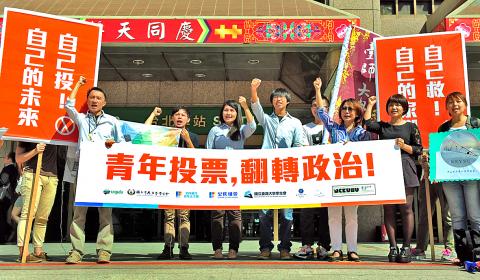The Taiwan Citizen Union and several students’ associations from universities nationwide yesterday urged young people to vote in the Nov. 29 nine-in-one elections, and said they were launching a crowdfunding campaign to help fund bus tickets for those wanting to return home to cast their ballots.
“There is actually an economic threshold to voting, as many students are unable to afford to go home to cast their ballot,” said Fan Yun (范雲), a National Taiwan University sociology professor and president of the Taiwan Citizen Union.
“It is important to tackle the disparity between the rich and the poor in terms of their ability to vote,” she said.

Photo: Lo Pei-der, Taipei Times
Hsu Wei-ting (許韋婷), a youth organizer with the union, said a train trip from Taipei to Greater Kaohsiung costs NT$843, while a student with a minimum-wage job makes just NT$920 a day.
The group plans to launch a fundraising campaign on Internet crowdfunding platform FlyingV, to raise NT$150,000 to fund a total of 22 bus routes on election day.
National Taiwan University Student Association president Sandy Wang (王日暄) backed the plan, saying that students should take responsibility in initiating social change.
The association had already launched a similar campaign to arrange bus trips from the school to locations across the country on voting day, providing discounted tickets to students, Wang said.
The union also encouraged students to carpool and share expenses for their trip by using Brazilian Internet platform Tripda.
Tripda Taiwan chief executive Crane Wang (王鶴穆) said the company supports youth engagement in social change regardless of political affiliation, adding that the firm intends to devote an online campaign to encourage its users to carpool on voting day and to vote.
The organizers also called on the government to formulate plans for absentee voting to ensure young people pursuing their studies far from home have an opportunity to vote. By law, people can only vote where their households are registered.

SHIPS, TRAINS AND AUTOMOBILES: The ministry has announced changes to varied transportation industries taking effect soon, with a number of effects for passengers Beginning next month, the post office is canceling signature upon delivery and written inquiry services for international registered small packets in accordance with the new policy of the Universal Postal Union, the Ministry of Transportation and Communications said yesterday. The new policy does not apply to packets that are to be delivered to China, the ministry said. Senders of international registered small packets would receive a NT$10 rebate on postage if the packets are sent from Jan. 1 to March 31, it added. The ministry said that three other policies are also scheduled to take effect next month. International cruise ship operators

HORROR STORIES: One victim recounted not realizing they had been stabbed and seeing people bleeding, while another recalled breaking down in tears after fleeing A man on Friday died after he tried to fight the knife-wielding suspect who went on a stabbing spree near two of Taipei’s busiest metro stations, Taipei Mayor Chiang Wan-an (蔣萬安) said. The 57-year-old man, identified by his family name, Yu (余), encountered the suspect at Exit M7 of Taipei Main Station and immediately tried to stop him, but was fatally wounded and later died, Chiang said, calling the incident “heartbreaking.” Yu’s family would receive at least NT$5 million (US$158,584) in compensation through the Taipei Rapid Transit Corp’s (TRTC) insurance coverage, he said after convening an emergency security response meeting yesterday morning. National

The Forestry and Nature Conservation Agency yesterday launched a gift box to market honey “certified by a Formosan black bear” in appreciation of a beekeeper’s amicable interaction with a honey-thieving bear. Beekeeper Chih Ming-chen (池明鎮) in January inspected his bee farm in Hualien County’s Jhuosi Township (卓溪) and found that more than 20 beehives had been destroyed and many hives were eaten, with bear droppings and paw prints near the destroyed hives, the agency said. Chih returned to the farm to move the remaining beehives away that evening when he encountered a Formosan black bear only 20m away, the agency said. The bear

PLANNED: The suspect visited the crime scene before the killings, seeking information on how to access the roof, and had extensively researched a 2014 stabbing incident The suspect in a stabbing attack that killed three people and injured 11 in Taipei on Friday had planned the assault and set fires at other locations earlier in the day, law enforcement officials said yesterday. National Police Agency (NPA) Director-General Chang Jung-hsin (張榮興) said the suspect, a 27-year-old man named Chang Wen (張文), began the attacks at 3:40pm, first setting off smoke bombs on a road, damaging cars and motorbikes. Earlier, Chang Wen set fire to a rental room where he was staying on Gongyuan Road in Zhongzheng District (中正), Chang Jung-hsin said. The suspect later threw smoke grenades near two exits